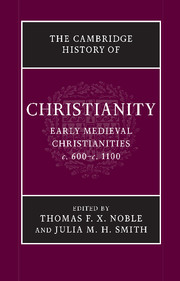Book contents
- Frontmatter
- Introduction: Christendom, c. 600
- Part I Foundations: Peoples, Places, and Traditions
- Part II Christianity in Confrontation
- Part III Christianity in the Social and Political Order
- 12 The Christian church as an institution
- 13 Asceticism and its institutions
- 14 Law and its applications
- 15 The problems of property
- 16 Ideas and applications of reform
- 17 Churches in the landscape
- Part IV Christianity as Lived Experience
- Part V Christianity: Books and Ideas
- Conclusion: Christendom, c. 1100
- Bibliographies
- Index
- References
15 - The problems of property
from Part III - Christianity in the Social and Political Order
Published online by Cambridge University Press: 28 March 2010
- Frontmatter
- Introduction: Christendom, c. 600
- Part I Foundations: Peoples, Places, and Traditions
- Part II Christianity in Confrontation
- Part III Christianity in the Social and Political Order
- 12 The Christian church as an institution
- 13 Asceticism and its institutions
- 14 Law and its applications
- 15 The problems of property
- 16 Ideas and applications of reform
- 17 Churches in the landscape
- Part IV Christianity as Lived Experience
- Part V Christianity: Books and Ideas
- Conclusion: Christendom, c. 1100
- Bibliographies
- Index
- References
Summary
The great bronze doors of the main basilica of the Benedictine monastery of Monte Cassino still bear extraordinary witness to its early medieval landed wealth. Inscribed on thirty-six panels are the names of the estates the monastery held or claimed by the early twelfth century. The first four panels list the forty-one possessions of the Terra S. Benedicti, the core properties of the house, claimed around 1105–15; most of the following panels can be associated with the abbacy of Oderisius II (1123–26). These claims were not exaggerated; of the 620 Cassinese charters contained in the Register of Paul the Deacon (compiled 1131–33), some 300 deal with estates mentioned on the doors. The monks were concerned to parade their landed wealth because for them, as for all other early medieval landowners, property represented not only an economic, but also a social resource. Nothing that the church wished to achieve – prayer and the performance of the liturgy, preaching and conversion, or charitable work – could be done without property. Ownership of land also defined status for institutions as much as for individuals; it was the means by which power was both created and expressed. The means by which religious institutions acquired, maintained, and protected their property in a dangerous world and the uses to which they put their possessions were issues with profound implications for their survival. So, too, was their degree of success in negotiating the web of human relationships which centered on the ownership of land.
- Type
- Chapter
- Information
- The Cambridge History of Christianity , pp. 327 - 344Publisher: Cambridge University PressPrint publication year: 2008
References
- 2
- Cited by

